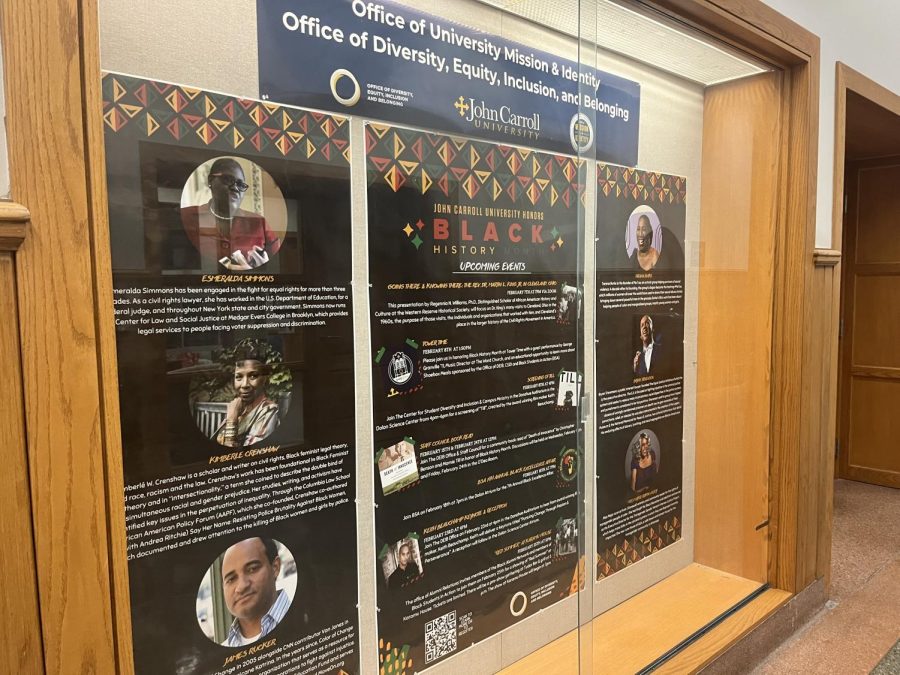A deep dive into the new DEIB minor at JCU
Managing Editor Laken Kincaid breaks down the new DEIB minor which was recently approved by the faculty council.
Feb 23, 2023
On Jan. 25, the JCU Faculty Council voted on three separate proposals for new academic programs including a Master’s Degree in Exercise Science Physiology, a Master’s Degree in Behavior Analysis and an undergraduate minor in Diversity, Equity, Inclusion and Belonging (DEIB). All of the proposals were approved and will be available for students within the coming academic year.
The DEIB minor, the proposition for which was originally drafted on Oct. 23, 2022, is an interdisciplinary program that will be available to students both in the Boler College of Business and in the College of Arts and Science starting this summer.
The minor mandates that students complete 18 credits within its curriculum and the course catalog incorporates many classes currently offered at JCU including various sociology, communication, philosophy, theology and history classes. Two new courses will be made from the creation of the minor including the required Multicultural Diversity in Organizations and an elective called Introduction to Intercultural Competence.
The original proposal states that the minor is separated into three distinct content areas including interpersonal dynamics across difference, multicultural diversity in organizations and structural patterns of indifference and justice. This third category requires students to choose three elective courses from two of the three categories provided which encompass race, class and culture, gender and sexuality as well as religion.
Within this original proposal, the purpose of the program “promises to promote students’ awareness of the variety of ways humans experience social bias and injustice in an increasingly diverse world. It additionally alerts them to the social benefits of pluralism, showing how diversity can enrich workplaces and the wider public. Finally, it calls on students to confront and address injustice in their workplaces and daily lives.”
It also seems to function as a bridge between Boler and CAS with the proposition calling the minor a “joint venture” between the two colleges. A statement within the budget document inside the original program proposal says that “the minor also will positively impact the bottom line at JCU by encouraging Boler students to enroll in more Humanities and Social Science classes.”
Learning goals of the minor include but are not limited to developing critical analysis, developing an integrative knowledge of the human world, skillful communication as well as engaging in respectful civil discourse. Regarding finances, the minor will have a director who will receive a $2000 stipend as well as two separate $3000 grants for course development.
However, another key facet within the budget document states that “the DEIB minor is unlikely to attract new students to JCU.” On the other hand, the hope for this endeavor is that this program “help[s] differentiate JCU when students are evaluating comparable majors at other schools.” The purpose of the minor adds that “it is particularly relevant for students considering careers in a multicultural setting, including business, counseling, education, law, government, medicine and nonprofit work.”
According to a survey sent out by The Carroll News via social media, around 71% of students are interested in a DEIB minor at JCU. Yet, as the program grows, these rates could fluctuate. Naomi Sigg, the Vice President of Diversity, Equity and Inclusion at JCU, is very optimistic about the minor’s impact on campus.
“John Carroll University’s view of diversity, equity, inclusion and belonging is a holistic one where students can learn inside and outside of the classroom,” Sigg told The Carroll News. “We are thrilled to launch the DEI minor which will allow students to explore key and foundational DEIB concepts that will help them during their time at JCU and beyond.”
Those interested in the program could see potential course offerings starting as early as this summer.













